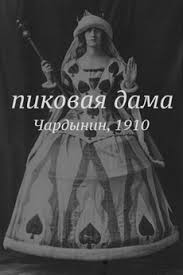
German (Petr Biriukov) watches his comrades playing a game of faro. His friends enjoy a good card game when they are relaxing. Although he likes watching, German himself never participates in the games. German learns that an elderly woman referred to as Countess (Antonina Pozharskaya), that lives in the area, is in possession of what is referred to as “The secret of the three cards”. This secret ensures that Countess never loses. German decides that he must learn the secret.
German also finds out that Countess is usually accompanied by her granddaughter, Liza (Aleksandra Goncharova). Liza is a beautiful young woman, and German is a little smitten by her. German arranges to meet Liza. In a passionate plea German convinces Liza of his love, and she falls madly in love with him. Later at a party, Liza gives German a key to her rooms and instructs him to visit her after the festivities.
German sneaks into Countess’ room to try to convince her to give him the secret of the three cards. Countess has a heart attack and dies. Later in his barracks, German is confronted by the ghost of Countess. She tells him the secret.
“The Queen of Spades” was released in 1910 and was directed by Pyotr Chardynin. It is a Russian supernatural short. The film was based on Alexander Pushkin’s 1834 story of human greed.
Other than the fact that this is the first film done based on the story, there isn’t anything special here. The story is condensed to the point where you really have no idea what is going on. The actual story that Pushkin wrote was still popular at the time the movie was made, and was considered a Russian classic, so it is most likely that anyone watching the film back then would have known the story and mentally filled in the blanks.
I think the film was mostly an attempt to explore the possibilities of film rather than the actual telling of the story. Pyotr Chardynin was more likely trying to push the boundaries of film and all of its technical attributes and so used a story he could tell without having to worry about actually telling it. All that being said, director Chardynin did a lousy job of it. The sets are cramped, the effects minimal, the story sparse and the directing flat. The cinematic technique that director Chardynin was searching for remained elusive. Altogether it was a rather disappointing and bland film.
Pushkin’s story was remade many times. Many of them Russian versions and several of them were done in the silent era. I believe there were somewhere around nine silent versions as well as an opera and some television adaptations.

